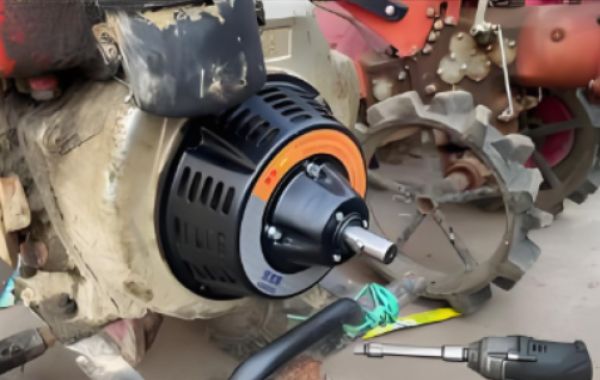A hand crank starter is a mechanical device used to manually start small engines. It works by turning a handle (the crank), which spins the engine’s flywheel fast enough to reach the ignition speed required to fire up the engine.
Unlike electric start systems, a hand crank starter operates without any batteries, wiring, or electronic components. This makes it highly reliable in environments where power supply is limited or conditions are harsh. Its simplicity and independence from electricity make it an ideal starting method for small diesel or gasoline engines found in portable generators, water pumps, agricultural tools, and construction equipment.
Pros and Cons of Hand Crank Starters
Hand crank starters continue to be a practical solution for powering up small engines, especially in off-grid or rugged settings. However, like any tool, they come with both benefits and trade-offs.
✅ Advantages of Hand Crank Starters:
No Power Needed
These starters work entirely without electricity, making them perfect for remote areas, emergencies, or backup power systems where electricity isn’t available.Mechanical Simplicity = Reliability
With no electrical parts to fail—like wires, fuses, or batteries—hand crank starters are less likely to break down. They perform well even in dusty, wet, or cold environments.Budget-Friendly Option
Hand crank starters are usually more affordable than electric systems. There's no need to purchase or replace batteries and electronic components, which helps keep costs low.Minimal Maintenance
Their straightforward mechanical design means fewer parts to wear out or go wrong, translating to lower maintenance and repair needs over time.Great for Remote and Outdoor Use
In isolated locations or off-grid work sites, a hand crank starter offers a dependable way to start engines on essential equipment like pumps and small generators.
❌ Disadvantages of Hand Crank Starters:
Requires Physical Strength
Starting the engine manually can take considerable effort, especially for larger small engines. This can be tiring or impractical for some users or frequent use.Not Suitable for Larger Engines
Hand crank starters are generally limited to smaller engines. For higher displacement engines, the manual cranking process may not generate enough torque or speed to start the engine reliably.Less Convenient
Unlike electric starters that engage with the push of a button, hand crank models require manual setup and repeated effort—less ideal when speed and ease are priorities.Risk of Injury
Improper use or cranking technique can lead to strain or injury. Users must follow safety precautions and proper handling procedures to avoid accidents.Poor Fit for High-Duty Cycles
If an engine needs to be started many times a day, the repetitive manual effort can become inefficient or physically demanding over time.







